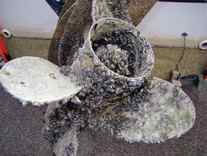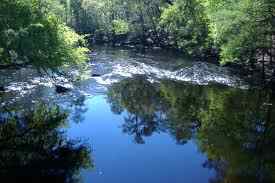Arizona Fish Report
Fish Report for 10-28-2013
Fish Report for 10-28-2013
NEW MEXICO DEPARTMENT OF GAME AND FISH PROTECTS WATERWAYS FROM ZEBRA & QUAGGA MUSSELS

by New Mexico Game & Fish Department
10-28-2013
888-248-6866
Website
SANTA FE - The New Mexico Department of Game and Fish has stepped up its efforts to keep zebra and quagga mussels out of New Mexico and the extra effort is paying off.
"So far we have not found any invasive mussels in our state's reservoirs," said James Dominguez, the Department's Aquatic Invasive Species Coordinator. "Zebra and quagga mussels have colonized waters in the states surrounding New Mexico, and the Department has been working hard to protect our water bodies from infestation."
This summer the Department added four boat inspectors stationed at checkpoints on Ute and Navajo lakes. Almost 9,000 watercraft inspections were conducted. Several boats that were inspected had recently been in out-of-state lakes known to be contaminated by the mussels. One boat with adult mussels was intercepted and decontaminated before being launched. In addition to watercraft inspections, the Department conducted early detection monitoring at reservoirs across the state. Testing for aquatic invasive species will continue through the fall. An updated education and awareness campaign is planned to launch this spring.
Zebra and quagga mussels are small, but they can cause huge problems. The mussels multiply rapidly and produce millions of larvae. Whole colonies can adhere to hard surfaces, like a boat engine. The mussels can clog water intake and delivery pipes used to supply drinking water, irrigation to farmlands, or water for hydroelectric power stations. The mussels can spread by hitching a ride on a boat or other equipment that has come in contact with infested waters. Adult mussels can survive out of the water for several days, while microscopic larvae can be transported in standing water left in bilges, ballast water, live wells, and on fishing and boating equipment.
Once established in lakes or rivers the mussels can spread throughout an entire drainage, increasing their devastating impact. Zebra and quagga mussels are native to Eastern Europe and were first detected in the U.S. in the 1980s. It is believed that shipping vessels entering the Great Lakes unknowingly transported these non-native mussels in their ballast water. If zebra and quagga mussels spread to N.M., they would add additional challenges and costs to managing the limited water resources available in the state. The invaders also compete with native species by filtering out food from lake water and chocking out aquatic plants and native mussels.
There are no known methods of eradicating the mussels. Preventing their introduction is the best strategy. The Department encourages the public to help stop the spread of zebra and quagga mussels, and other aquatic invasive species by cleaning, draining and drying boats and equipment after every boating or fishing trip. Visit www.wildlife.state.nm.us for more information.
"So far we have not found any invasive mussels in our state's reservoirs," said James Dominguez, the Department's Aquatic Invasive Species Coordinator. "Zebra and quagga mussels have colonized waters in the states surrounding New Mexico, and the Department has been working hard to protect our water bodies from infestation."
This summer the Department added four boat inspectors stationed at checkpoints on Ute and Navajo lakes. Almost 9,000 watercraft inspections were conducted. Several boats that were inspected had recently been in out-of-state lakes known to be contaminated by the mussels. One boat with adult mussels was intercepted and decontaminated before being launched. In addition to watercraft inspections, the Department conducted early detection monitoring at reservoirs across the state. Testing for aquatic invasive species will continue through the fall. An updated education and awareness campaign is planned to launch this spring.
Zebra and quagga mussels are small, but they can cause huge problems. The mussels multiply rapidly and produce millions of larvae. Whole colonies can adhere to hard surfaces, like a boat engine. The mussels can clog water intake and delivery pipes used to supply drinking water, irrigation to farmlands, or water for hydroelectric power stations. The mussels can spread by hitching a ride on a boat or other equipment that has come in contact with infested waters. Adult mussels can survive out of the water for several days, while microscopic larvae can be transported in standing water left in bilges, ballast water, live wells, and on fishing and boating equipment.
Once established in lakes or rivers the mussels can spread throughout an entire drainage, increasing their devastating impact. Zebra and quagga mussels are native to Eastern Europe and were first detected in the U.S. in the 1980s. It is believed that shipping vessels entering the Great Lakes unknowingly transported these non-native mussels in their ballast water. If zebra and quagga mussels spread to N.M., they would add additional challenges and costs to managing the limited water resources available in the state. The invaders also compete with native species by filtering out food from lake water and chocking out aquatic plants and native mussels.
There are no known methods of eradicating the mussels. Preventing their introduction is the best strategy. The Department encourages the public to help stop the spread of zebra and quagga mussels, and other aquatic invasive species by cleaning, draining and drying boats and equipment after every boating or fishing trip. Visit www.wildlife.state.nm.us for more information.
More Reports
New Mexico Game & Fish Department Reports
for Thursday, October 24th, 2013
: TOXIC ALGAE CAUSE OF 100 ELK DEATHS IN NORTHEASTERN NEW MEXICO
Santa Fe River: Fishing bag limits, tackle restrictions lifted on Santa Fe River

10-17-2013
HACHITA - Glenn Fuller, pictured of Farmington became the first New Mexico resident to draw for and successfully hunt a...... Read More

Arizona.FishReports.com © 2026. All Rights Reserved.
Website Hosting and Design provided by TECK.net
Website Hosting and Design provided by TECK.net